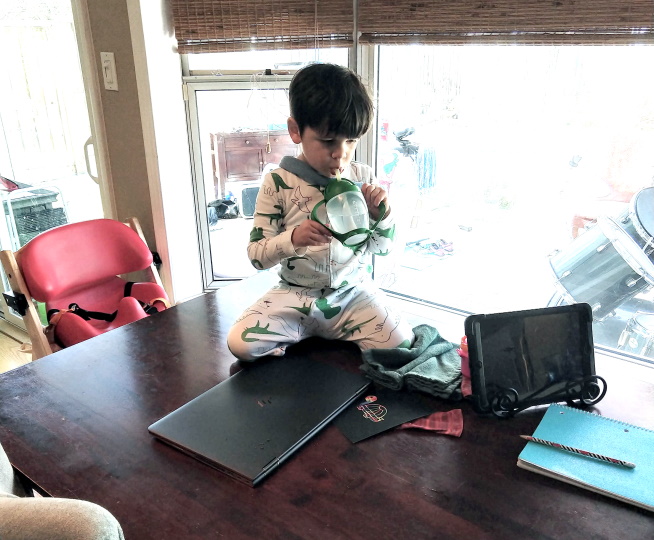
Dangerously Mobile – One who can move their body, but has limited awareness of the implications and boundaries of their movements.
Think about it like this. Imagine you are on a boat. The boat is moving. It’s moving fast. You are trying to gain your balance and walk from one end to the other, but the waves are unpredictable, and it feels as though the ground is always in motion – because it is. Slowly you are making your way, no, actually, you are moving pretty fast now because you think you can make it to the desired location. Now a flash catches your eye, and your body is slow to react to the next movement you just told it to make, and you fall. You get up, over and over. Someone is yelling at you to sit down and wait for the boat to stop, but you can’t hear them, or process what they are saying because the engine is so loud you don’t even know anyone is speaking to you. So you continue to fall again and again. You never stop walking, regardless of how many times you fall. The boat now docks. But you have been moving the entire time the boat was, so when you place your feet on land, you still can’t control your body. You are telling your leg, “move,” and it is, but it isn’t listening to the command in the way your brain thinks it is sending it. You fall again, legs tired and feeling like jelly, even though you are now on steady land.
That is my son.
He can’t process the information you are giving him, such as to move slower or watch out for the wall. He steps on anything that is on the floor; therefore, if I am not continually cleaning, the ground will move from under him at any moment as he slips on a toy. He tends not to be aware of his surroundings and will place his body in harm’s way, such as dropping his body on steps or climbing up a table and just taking a step off said table, not realizing the consequences to that action.
My son needs 24 hours a day of constant supervision.
My son is not alone, though. You often hear stories of children leaving their home, and if fortunate enough, found wandering streets in their pajamas improperly dressed because they cannot process the reality of what leaving their home means. Many don’t have the means to find their way home either.
I was very naïve and will admit, the first time I heard a story of a child wandering from their home, I said, “where were the parents?” Here I am now, entangled in a world of living with a cognitively impaired child and dreading the day he learns how to open a door.
I live in a world where to protect my son, he wears pants in the summer, so his knees aren’t habitually covered in scrapes and bruises from the way he drops down on them over and over. You live in a world where my son needs to be in a stroller when we are in public or go for a walk around the block because, at the age of four, he still doesn’t grasp the concept of holding a hand or walking forward. In a world that if I yell, “NO,” or “Stop,” even his name, there is no reaction from my son. I live in a world where I dread my son gaining skills that could lead to him hurting himself; such skills as opening a door, taking his shoes and clothes off, holding a fork, skills designed to make life better. With the possibility, he will not understand how to use the skill as designed. So I worry about taking that next step.
Being dangerously mobile can mean different things to different families. It can be a child who could be integrated with their peers but can have a sudden outburst of emotion that can cause conflicts. Impulse control, something we learn and matures with age and time for many of us, doesn’t happen for everyone. Maybe Pica, a person who has an impulse to put things in their mouth and eat inedible objects, the list goes on.
My son needs 24 hours a day of constant supervision. He could and will choke himself, purely by not understanding he even is doing it by pulling on his clothes. He will try to climb the oven to get to the stove top. He doesn’t understand the consequences of actions, even when they are harmful and painful. He will place anything he can in his mouth, and it doesn’t matter if it’s food, a rock, a sticker, the dog’s food, paper, a marker, Play-doh, anything. He will do the same thing over and over, and I don’t think it’s because he expects a different result, it’s because he doesn’t think about the fact there even is a result.
Outside of the special needs community, I don’t honestly believe the world understands the amount of stress and pressure that is put on caregivers to keep people who are dangerously mobile safe. The fight with schools, insurance companies – who make you beg, fight and plea for options to keep our loved ones safe and then deny us what they truly need because they determined it wasn’t a necessity (a topic all within itself) – federal and local governments, the lack of awareness that this is reality is something I hope we can battle together. Because this will be a battle…



